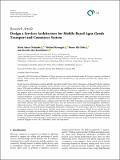| dc.description.abstract | Despite massive mobile phones adoption globally, Agriculture Supply Chain (ASC) in Tanzania is challenged by the low adoption
of m-commerce integrated to m-payment and m-transport services as key information enablers for efficiently linking farmers to
buyers. With such an inefficient and ineffective information gap, middlemen have become information custodians by decreasing
farmers’ bargaining power in the market. In addressing the challenge, this study uses stakeholders to validate core services needed
and proposes service architecture for Agro-Goods Transport and Commerce (AgroTC) system using installable and build-in
mobile phone applications (internet web, mobile apps, and USSD). The proposed method appreciates a user-centric approach for
system development. A scenario of the potato supply chain in Tanzania was considered where 2309 respondents were interviewed
from farmers, buyers, and transport service providers from a predetermined sample size (n = 384) having a 95% confidence level.
Data were collected using mobile phones configured with Open Data Kit (ODK) technology and analyzed using the R Studio tool
with Pandas libraries. The results indicated that buyers were not interested in disease and land management information.
Collectively, farmers (74%) and buyers (60%) highly demand m-commerce services as a virtual platform for linking them. Only
farmers showed concern about disease management information. Furthermore, 35% of the farmers and 57% of the buyers need
m-transport, whereas 35% of the farmers and 69% of the buyers need m-payment service Deleted. It was revealed that the
remaining percentages lack knowledge on mobile phone features to perform online businesses. All transport service providers
pointed to the challenge of existing middlemen in reaching customers and required technological change in managing transport
systems. The proposed mobile-based AgroTC architecture provides a foundation business approach in Tanzania and many
developing countries. System developers and innovators can use the proposed architecture design to design prototypes using the
preferred language to meet ASC stakeholders’ needs and expectations | en_US |

